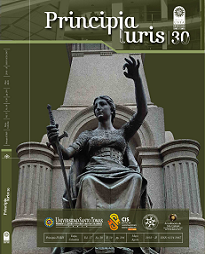THE ENVIRONMENTAL PARADOX IN THE COLOMBIAN POST-CONFLICT
Main Article Content
Abstract
Article Details
Por medio de esta comunicación certifico que el artículo que estoy presentando para posible publicación en la revista institucional impulsada de la Facultad de Derecho de la Universidad Santo Tomás seccional Tunja, Principia Iuris, es de mi entera autoría, siendo sus contenidos producto de mi directa contribución intelectual.
Todos los datos y referencias a publicaciones hechas están debidamente identificados con su respectiva nota bibliográfica y en las citas que se destacan como tal.
Por todo lo anterior, declaro que el material presentado se encuentra conforme a la legislación aplicable en materia de propiedad intelectual, y por lo tanto, me hago responsable de cualquier reclamación relacionada a esta.
En caso de que el artículo presentado sea publicado, manifiesto que cedo plenamente a la Universidad Santo Tomás seccional Tunja los derechos de reproducción del mismo y accedo a las modificaciones que de forma se requieran para adaptarse a la estética de la revista. Como contraprestación de la presente cesión, declaro mi conformidad de recibir (2) ejemplares del número de la revista en que aparezca mi artículo.
References
Baudry, A. (2012). RD Congo: Paraíso de la biodiversidad en problemas. (Recuperado de: http://www.ipsnoticias.net/2012/07/rd-congo-paraiso-de-la-biodiversidad-enproblemas/ )
Bejarano Guzmán, R. (2016). El consultorio jurídico del posconflicto. (Recuperado de: http://www.ambitojuridico.com/BancoConocimiento/Procesal-y-Disciplinario/ el-consultorio-juridico-del-posconflicto )
Bwenda. (2008). República Democrática del Congo: deforestación en áreas protegidas para minería en la provincia de Katanga. El caso de la Reserva de Basse Kando. (Recuperado de: https://wrmbulletin.wordpress.com/2008/08/23/republica-democratica-del-congodeforestacion-en-areas-protegidas-para-mineria-en-la-provincia-de-katanga-elcaso-de-la-reserva-de-basse-kando/ )
Castaño, J. (2015). Colombia, el tercer país que más agua tiene en el mundo. El Universal. (Recuperado de: http://www.eluniversal.com.co/ambiente/colombia-el-tercerpais-que-mas-agua-tiene-en-el-mundo-186844 )
Cervera Vallterra, M. (2014). El caso de la República Democrática del Congo: efectos perversos de la globalización en un Estado fallido. Anuario español de derecho internacional / vol. 30 / 2014. (Recuperado de: file: ///C:/Users/SAMSUNG/Downloads/9113439-1-PB.pdf )
Congreso de la República de Colombia (1998) Ley 489
Congreso de la República de Colombia (1993) Ley 99
Constitución Política de Colombia de 1991.
Euskal Batzordea. (2008). El origen del conflicto de la RDC. (Recuperado de: http://www. congordvisible.org/causas.php ).
Fajardo Gómez, M. Consejero Ponente: Providencia del 29 de agosto de 2007. Radicación número: 15324.
Hernández Galindo, J. G. Magistrado Corte Constitucional. Sentencia C-037 de 1998.
Rodríguez R. L. (2013). Derecho administrativo general y colombiano. Decimoctava edición. Bogotá: Editorial Temis.
Silva Herrera, J. (2015). ¿Qué le espera al medioambiente en el escenario del posconflicto? El Tiempo. (Recuperado de: http://www.eltiempo.com/estilo-de-vida/ciencia/ medioambiente-en-el-posconflicto/15210177 )
Sistema de las Naciones Unidas en Colombia y Ministerio de Ambiente y Desarrollo Sostenible. (2014) p 9. Consideraciones ambientales para la construcción de una paz territorial estable, duradera y sostenible en Colombia. Insumos para la discusión. (Recuperado de: http://reliefweb.int/sites/reliefweb.int/files/resources/Consideraciones%20ambientales%20para%20la%20construccion%20de%20una%20paz%20 territorial%20estable%20duradera%20y%20sostenible%20en%20Colombia.pdf)
Younes Moreno, D. (2013). Derecho administrativo laboral. Bogotá: Editorial Temis.

